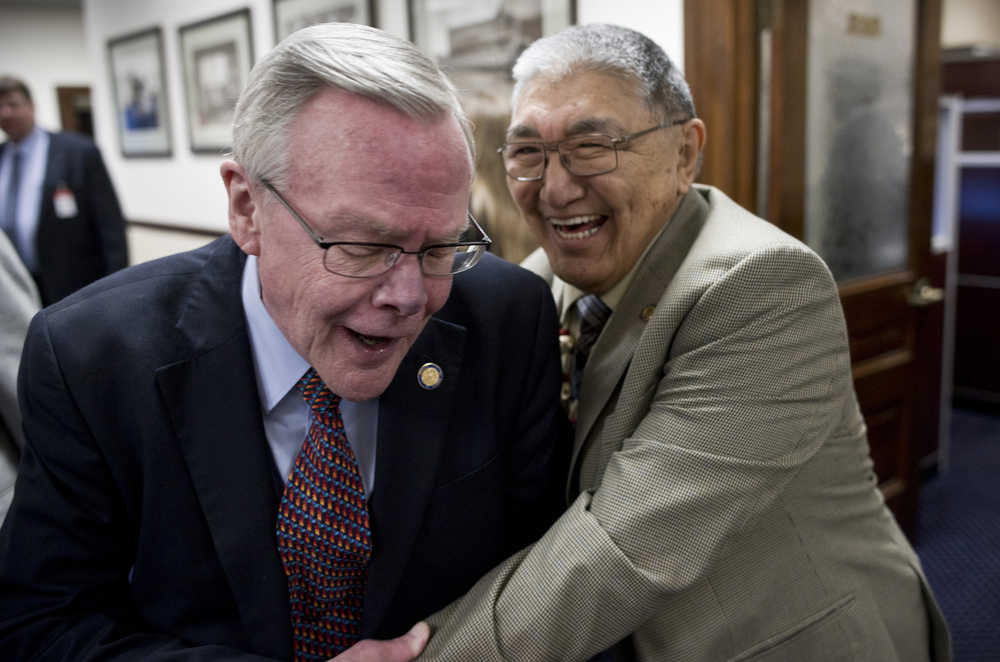On Tuesday afternoon, Rep. Matt Claman, D-Anchorage, and Rep. Lance Pruitt, R-Anchorage, climbed the steps of the Capitol together with smiles on their faces.
They traded jokes and walked into the waiting office of Gov. Bill Walker, who extended his hand for a shake.
“What’s the good word?” Walker asked the men as they delivered the traditional announcement that the Alaska House of Representatives is in session.
For the next 89 days – and likely longer – lawmakers will struggle to eliminate or at least contain the state’s $3.5 billion annual deficit. The true figure is likely larger, but the price of oil has been falling faster than the state’s ability to redraft the numbers. As of Friday, the price of a barrel of Alaska North Slope crude oil was below $30 – cheaper than the barrel itself.
“We believe this may be the most challenging … legislative session in which any of us will serve,” said Sen. Berta Gardner, D-Anchorage, shortly after the Senate opened the second session of the 29th Alaska Legislature.
“It will be a challenging year, but together we’ll get through this fine and Alaska will be a better state because of it,” Sen. Kevin Meyer, R-Anchorage and the Senate President, said after Gardner’s remarks.
Walker, speaking to the Empire in his office, said the first week of the legislative session will set the tone for the details of the debates that follow.
In October, the Walker administration unveiled a comprehensive plan to balance the state’s budget by turning the Alaska Permanent Fund into a money factory. Earnings from the fund would cover a portion of state operating expenses, while oil and mineral prices would fund a smaller and more volatile Permanent Fund Dividend, an inversion of the existing setup.
The Walker plan wouldn’t cover all of the state’s needs: In December, the governor proposed a range of tax increases and budget cuts to do the rest of the work.
On Tuesday, the Senate received 10 bills from the governor to implement his fiscal plan. That total does not include the three budget bills considered every year by the Legislature.
Walker said he wouldn’t be disappointed if the Legislature throws out his suggestions and picks its own way to balance the state budget, but “it’s got to be a whole plan,” he said. “I don’t care who gets the credit on any of this.”
He declined to speculate on what he will do if the Legislature chooses to pass a plan that does not balance the budget in the long term.
“I always reserve my position on any bills,” he said about whether he would veto an incomplete plan. He added that it would depend upon “where we are” in regard to oil prices, spending cuts and additional taxes.
On non-budget items, Walker said he thinks natural gas pipeline issues will require a special session to address.
Health care reform and prison reform are other significant topics, but “every one of those things is affected if the money isn’t there,” he said.
Hanging above everything the Legislature does this session are this fall’s elections. Ten members of the Senate and all 40 members of the House are up for re-election this year, but those contacted by the Empire were careful to say that the impending vote should not affect their work.
“The election should have zero bearing on what we do this session,” said Sen. Bill Wielechowski, D-Anchorage. With elections every other year, lawmakers can’t shrug off choices simply because there’s an election. “You simply can’t have a legislature that refuses to make tough decisions every other year.”
The Senate Finance Committee will open its work on those tough decisions at 10 a.m. this morning as Pat Pitney, the state budget director, presents an introduction to next fiscal year’s plan.
The Legislature’s next big event will take place at 7 p.m. Thursday night as Walker delivers his State of the State address to a joint session of the Legislature. The speech will be broadcast by radio on KTOO-FM and on TV by Gavel Alaska.
Legislators are also expected tonight at Juneau’s 31st annual Legislative welcome reception. That takes place 5-6:30 p.m. in Centennial Hall.

